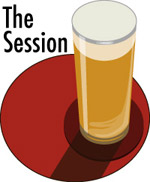 Have you heard the one about an Englishman, a Belgian and a Czech who walk into a drinking establishment, whereupon the Englishman orders a round of “session” beers?
Have you heard the one about an Englishman, a Belgian and a Czech who walk into a drinking establishment, whereupon the Englishman orders a round of “session” beers?
There is no punchline. Instead another question. What do you think the Czech is drinking?
The topic for the 40th gathering of The Session is Session Beer. Host Erik Myers has offered plenty of options in announcing the theme, but this is a subject that screams for context.
What we (meaning Anglo-Saxons, I guess) choose to call “session” beers are unique to the social gatherings — perhaps lasting hours, involving several beers and plenty of conversation — where they are enjoyed. Are these still “sessions” in West Flanders and Bohemia? In Berlin and Munich? What about the emerging beer cultures of Brazil, Denmark and Italy?
Probably, though not in name. Are the beers the same? Not usually. Does everybody depart a “session” in the same state of inebriation? Not likely.
For the record, I’m a big fan of The Session Beer Project. I’d much prefer pubs to coffee shops sa great good places (and not just because I don’t drink coffee). I really appreciate brewers who find ways to pack more flavor and less alcohol in a glass.
And until Erik set the theme for this round of The Session I hadn’t thought twice about calling session beers “session beers” (or do I mean “session beers” session beers?). The current All About Beer magazine has a feature using the words “session” and “session beers” and I suspect few readers will have any problem immediately understanding what Rick Lyke’s story is about.
It works, so why worry? I’m not registering a complaint so much as a concern, thinking about what the Czech beer drinker at the top would order. America’s own emerging beer culture has plenty to learn from others. The beers, whatever we call them, will follow.